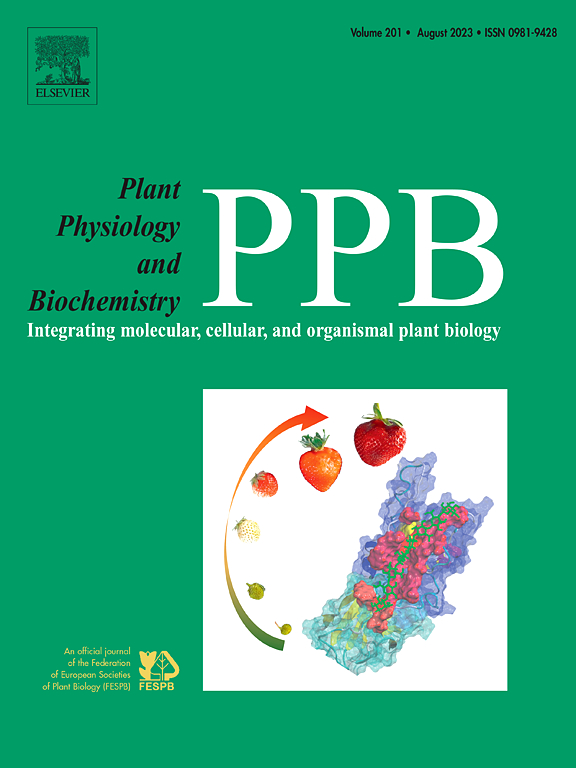MaMPK19,一个通过激活香蕉 CBF 途径增强抗寒性的关键基因。
IF 6.1
2区 生物学
Q1 PLANT SCIENCES
引用次数: 0
摘要
MPK在植物低温胁迫过程中起着至关重要的作用。本研究利用MPK的特异性抑制剂SB203580喷洒香蕉叶片,并在本苋和香蕉中过表达MaMPK19,探讨MaMPK19对抗寒性的影响及下游基因的调控模式。此外,我们还优化了香蕉的遗传转化方法,为建立高效的遗传转化体系奠定了基础。结果表明,40 μmol L-1 SB203580能显著降低MaMPK19和MaCBFs的表达,削弱香蕉在4 ℃下的抗寒性。感染农杆菌后,'天宝'、'巴西'和'印尼'(Musa spp. AAA Group, Cavendish)的不定芽再生率分别达到 10.43%、15.81% 和 14.23%。阳性率分别为 10.71%、2.25% 和 6.94%。MaMPK19的过表达增强了香蕉的抗寒性。MaMPK19促进了MaICE1、MaDREB1D和MaCOR413的表达。此外,MaMPK19 还提高了 POD 活性以及 ABA 和 JA 的含量。我们的研究强调了 MaMPK19 在提高香蕉抗寒性方面的重要性,并为生物育种提供了参考。本文章由计算机程序翻译,如有差异,请以英文原文为准。
MaMPK19, a key gene enhancing cold resistance by activating the CBF pathway in banana
MPKs play an essential part role in the process of plant low temperature stress. In this study, the specific inhibitor SB203580 of MPK was used to spray banana leaves and MaMPK19 was overexpressed in N.benthamiana and banana to explore the effect of MaMPK19 on cold resistance and the regulation mode of downstream genes. Additionally, we optimized the method of genetic transformation of banana laying the foundation for the establishment of an efficient genetic transformation system. The results showed that 40 μmol L−1 SB203580 could significantly reduce the expression of MaMPK19 and MaCBFs, as well as weaken the cold resistance of banana at 4 °C. After agrobacterium tumefaciens infection, the regeneration rates of adventitious buds in ‘Tianbao’, ‘Brazilian’ and‘Indonesia’ (Musa spp. AAA Group, Cavendish) reached 10.43%, 15.81% and 14.23%, respectively. And the positive rates reached 10.71%, 2.25% and 6.94%, respectively. Overexpression of MaMPK19 enhanced the cold resistance of N.benthamiana and bananas. MaMPK19 promoted the expression of MaICE1, MaDREB1D and MaCOR413. Furthermore, MaMPK19 increased POD activity and the content of ABA and JA. Our study highlights the importance of MaMPK19 in improving the cold resistance of bananas and provides a reference for biological breeding.
求助全文
通过发布文献求助,成功后即可免费获取论文全文。
去求助
来源期刊
CiteScore
11.10
自引率
3.10%
发文量
410
审稿时长
33 days
期刊介绍:
Plant Physiology and Biochemistry publishes original theoretical, experimental and technical contributions in the various fields of plant physiology (biochemistry, physiology, structure, genetics, plant-microbe interactions, etc.) at diverse levels of integration (molecular, subcellular, cellular, organ, whole plant, environmental). Opinions expressed in the journal are the sole responsibility of the authors and publication does not imply the editors'' agreement.
Manuscripts describing molecular-genetic and/or gene expression data that are not integrated with biochemical analysis and/or actual measurements of plant physiological processes are not suitable for PPB. Also "Omics" studies (transcriptomics, proteomics, metabolomics, etc.) reporting descriptive analysis without an element of functional validation assays, will not be considered. Similarly, applied agronomic or phytochemical studies that generate no new, fundamental insights in plant physiological and/or biochemical processes are not suitable for publication in PPB.
Plant Physiology and Biochemistry publishes several types of articles: Reviews, Papers and Short Papers. Articles for Reviews are either invited by the editor or proposed by the authors for the editor''s prior agreement. Reviews should not exceed 40 typewritten pages and Short Papers no more than approximately 8 typewritten pages. The fundamental character of Plant Physiology and Biochemistry remains that of a journal for original results.

 求助内容:
求助内容: 应助结果提醒方式:
应助结果提醒方式:


